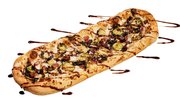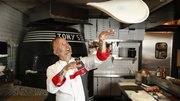News
Brand profile: Zaxby's
Chicken fingers made to order captures industry niche.
April 16, 2008
When Zach McLeroy and Tony Townley opened Zaxby's in 1990, they envisioned a self-operated chain of 10 units. But given the condition of their first, lowly store — McLeroy called it a "glorified deck with a roof on it." — some might have thought their dream optimistic. Certainly no one would have recognized it as the seedling of a fast-casual powerhouse.
Despite its shortcomings, the chicken shack worked well. Positioned next door to Georgia Southern University in Statesboro, Zaxby's drew large crowds of students seeking affordable beer and boneless chicken. Inspired by the response, the men poured all of their profits back into the company and flogged themselves with 100-hour work weeks.
"When we first started, every location looked very ‘mom and pop,'" said McLeroy, chief executive of the Athens, Ga.-based company. Zaxby's now boasts 411 units and generates $500 million in annual sales. "We'd remodel new ones with no particular branded look, put some paint and a sign on it, and think that was enough to be branded."
Not quite, and definitely not in the southeast U.S., a market replete with commanding poultry players. At least Zaxby's core product was strong: boneless, fresh-battered chicken fingers fried to order. Salads, wings and sandwiches rounded out the fare.
"There were plenty of bone-in products out there, so we knew ours had to be better and different," McLeroy said. "Our chicken comes in fresh, we marinate it for 24 hours, and when you order it, we fry it. Back then, nobody was doing that."
In a culture that connects fried chicken with fast food, Zaxby's recognized speed of service as essential and added drive-thrus early on. According to Townley, Zaxby's original drive-thru concept essentially was a pick-up window where customers ordered and waited 10 minutes for their food. "And that was too long," McLeroy said.
Zaxby's wanted it all: quick-service speed and fast-casual food standards. To achieve that, chief operating officer Robert Baxley said the company installed timers in its drive-thru lanes and dedicated order-takers solely to drive-thru. It also refined "just in time" cooking strategies based on daypart sales peaks. The effort chiseled transaction times down to about four minutes.
"We're not as fast as McDonald's, but we're much faster than we were," said Baxley, who was hired as a Zaxby's cook 17 years ago. "You're getting a prepared-to-order menu with nearly the same speed as fast-food drive-thru."
The imitation of quick-service strategies, however, stops at service speed. Zaxby's avoids coupons because McLeroy said they create negative, low-price expectations in customers' minds. Zaxby's only discounts products when generating attention for new store openings.
Zaxby's also has increased its market share among females by increasing its fresh salad offerings. Baxley called them casual-dining quality delivered at prices just a notch above fast food.
"We used to serve salads — we call them Zalads — in disposable containers, and all we were serving was about 30 a day," Baxley said. Zalad prices run around $5.50. "But then we started serving them in a washable melamine bowl, and sales went up to about 150 a day. Zalads have been a home run for us."
Despite its fast-casual standing, the chain isn't insensitive to the need for some lowerpriced options amid talk of a U.S. recession. Townley said some $4.99 value deals, based on smaller-sized existing menu items, are on the way.
McLeroy said the company learned some lessons in 2007 that led it to prepare for 2008. "Last year we believed some casual-dining customers were trading down to us, but we think this year we may see people trading down from us to fast food."
All Zaxby's stores are located in 11 Southeastern states, though units in Texas and Ohio are slated for spring openings. Officials believe strongly in adding markets in contiguous states to capture brand recognition flowing from nearby markets.
Company stores always are first to enter new territories, McLeroy said, to ensure future franchisees of the area's promise. "We like to take the risk instead of putting a licensee in jeopardy."
By all accounts, Zaxby's operators are a happy group. Not only have many one-time employees become franchisees, some of Zaxby's suppliers have joined the flock. Paul DeMersseman, senior vice president of Athens-based Peachtree Planning Corp. anda longtime financial advisor to McLeroy and Townley, became a Zaxby'sfranchisee in 1999. Last year, he opened his seventh outlet.
"When I saw vendors doing business with them as stores opened, I knew something right was going on," DeMersseman said. "Zaxby's is a good company, but what I don't think people see is that people get involved because they want to do business with Zach and Tony."
DeMersseman said McLeroy and Townley were humble when he first met them, and their enormous success hasn't changed them.
"It's been a great story with a lot more success to come — and I'm not just saying that because I'm involved," he said. "Tony and Zach don't care who gets the credit; they're just interested in making this business more available to more people."
 ChatGPT
ChatGPT Grok
Grok Perplexity
Perplexity Claude
Claude












